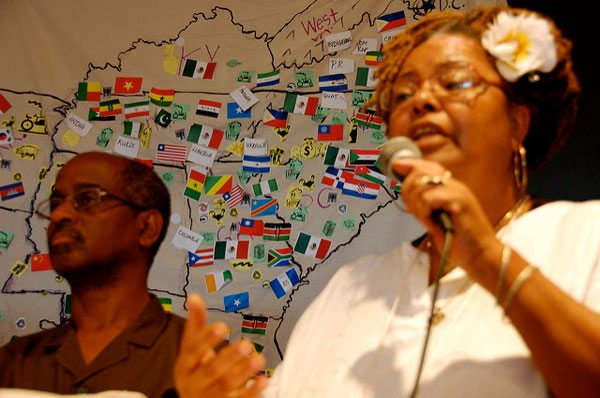
September 18, 2017; Washington Post
Last week, NPQ published a newswire by Carole Levine on the historic and pernicious role of color in the sorting of immigrants and refugees. But structural racism often operates under cover of complexity. This veil, however, can be pierced through looking at systemic data, and that is what advocates for Black immigrants are trying to do even as both the issues of race and immigration are at a boiling point—striking as the iron is hot.
The Pew Research Center reports that, in 2016, 32 percent of all refugees that came to the United States were from Africa. Three countries—Democratic Republic of the Congo, Somalia, and Eritrea—are the leading countries of origin. This number is even higher in 2017, with the New York Times reporting that 36 percent of all refugees resettled in the United States came from countries in Africa (primarily from six countries: Congo, Somalia, Eritrea, Ethiopia, Sudan, and the Central African Republic)
Not only are people of African descent a large part of the immigrant and refugee population, they are disproportionately targeted for removal. A report by the Black Alliance for Just Immigration (BAJI) and New York University Law School’s Immigrants’ Rights Clinic found that while Black immigrants make up seven percent of all immigrants (roughly 3.4 million people), they make up more than 10.6 percent of immigrants in removal proceedings between 2003 and 2015. In the 2014 fiscal year, Immigration and Customs Enforcement (ICE) deported 1,203 African immigrants.
This number is even greater when it comes to noncitizens facing deportation on criminal grounds, where African immigrants make up more than 20 percent of that population. It is well known that Blacks living in the United States are more likely to be arrested, but this precedent of criminalization is even graver for immigrants, who face the threat of deportation if they become involved in a criminal proceeding. Many Black immigrants live in urban areas and are more likely to have a police encounter as a result. When Pew compared immigrant groups by region in fiscal year 2013, they found 76 percent of Black immigrants were deported on criminal grounds, in contrast to 45 percent overall, 38 percent of Asian immigrants, 47 percent of South American immigrants and 54 percent of European immigrants.
Carl Lipscombe, policy director for BAJI and a co-author of the 2016 State of Black Immigrants report, says he saw this same pattern as a public defender in New York City, where a federal judge found the police department’s stop-and-frisk program unconstitutional after it was proven to disproportionately target Blacks.
Sign up for our free newsletters
Subscribe to NPQ's newsletters to have our top stories delivered directly to your inbox.
By signing up, you agree to our privacy policy and terms of use, and to receive messages from NPQ and our partners.
I encountered dozens of young Black immigrants who were arrested for minor offenses such as possession of marijuana and the district attorney would offer them a $25 fine if they pleaded guilty. This is why we say Black immigrants are similarly situated to African Americans, except they face the additional consequence of deportation.
This sentiment was echoed by Jonathan Jayes-Green, co-founder of the UndocuBlack Network, a multigenerational network of currently and formerly undocumented Black immigrants. Jayes-Green, himself an Afro-Panamanian immigrant who came under the protection of the Deferred Action for Childhood Arrivals (DACA) program at age 13, told NBC News, “We know that Black immigrants have traditionally borne the brunt of their circumstances. They are three times more likely to be deported and much more likely to be caught up in the criminal justice system because of their color.”
BAJI estimates that 12,000 DACA recipients are Black. The three top countries of origin for Black DACA immigrants are Jamaica (5,302 approved applicants), Trinidad and Tobago (4,077 approved), and Nigeria (2,095 approved). According to BAJI’s 2016 State of Black Immigrants report, the majority of people who took advantage of DACA were Mexicans, at 78 percent of application-approval rates. Comparatively, only three percent of African immigrants and two percent of people of Caribbean descent were eligible for DACA, out of an eligibility pool of 1.2 million.
Carl Lipscombe tells The Root that Black immigrants are not a focal point of the DACA conversation because the program never prioritized Black communities. He goes on to suggest that when the Obama administration marketed the program, most of the attention was tailored to Latinx communities, leaving Black undocumented immigrants unaware of DACA’s benefits. “It really boils down to an element of white supremacy within the immigrant-rights movement that preferences light-skinned people,” he says.
In spite of all the challenges, including Trump administration efforts to cap the number of refugees and immigrants living in the United States, BAJI’s work to counter Black immigrants’ invisibility continues to progress. BAJI began in 2006 in response to repressive immigration bills then under consideration by the U.S. Congress. Since then, it has created a detainee support toolkit and collaborated on a series of “Know Your Rights” videos created by Immigrant Defense Project on how to prepare for an encounter with ICE. Additionally, BAJI is leading the effort to protect Haitian immigrants from losing their Temporary Protected Status (TPS), the humanitarian relief status granted after Haiti’s devastating 2010 earthquake, from which it has yet to fully recover. The Trump administration has sent strong signals that it plans to end the program in January 2018, but BAJI is working to ensure that does not occur.
Jayes-Green sums up the work ahead perfectly: “We have an inexplicable resilience and resistance. We have to hold onto our value and beliefs. We are freedom fighters and understand that our Ancestors are with us. Historically they overcame the odds and we will too.”—Alexis Buchanan













